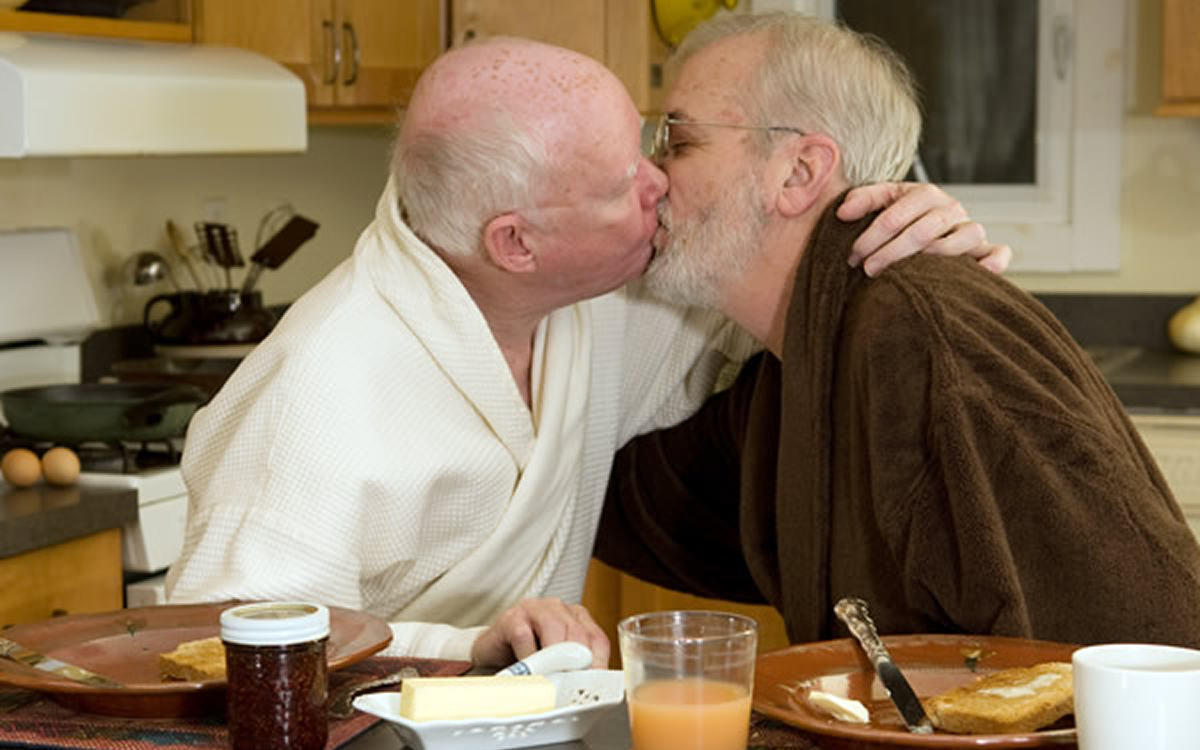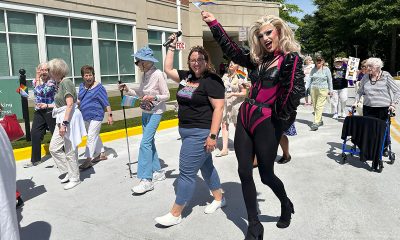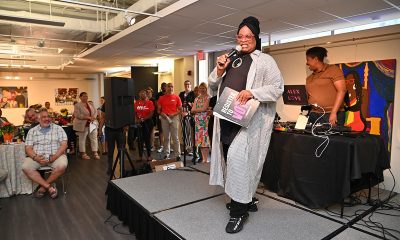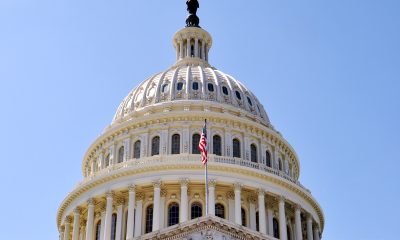National
New report outlines problems faced by LGBTQ+ nursing home residents
Authors recommend supportive policies, training for nation’s 15,000 facilities

A recently published academic journal article by two University of Indiana researchers reports on problems faced by LGBTQ+ older adults living in the nation’s nursing homes and recommends actions nursing homes should take to ensure LGBTQ+ residents are treated equitably and without bias.
The article, entitled “Postacute Care and Long-Term Care for LGBTQ+ Older Adults,” was published Nov. 9 in the peer reviewed journal Clinics In Geriatric Medicine. It is co-authored by geriatric physician Jennifer L. Carnahan, a research scientist with the Regenstrief Institute, which is affiliated with Indiana University’s Center for Aging Research and Andrew C. Picket, an elder care researcher and assistant professor at Indiana University’s School of Public Health in Bloomington. Carnahan also serves as an assistant professor of medicine at the Indiana University School of Medicine.
“Cultivating an inclusive and LGBTQ+ culturally competent nursing home culture means that all staff and clinicians should receive training specific to working with this group and time should be allocated for this to reduce staff burden,” the article states.
It points out that while some older LGBTQ+ adults fear being forced into the closet while in a nursing home, “they also simultaneously fear unwanted disclosure of their sexual orientation or gender identity status, and their autonomy should be respected either way.”
The article says there are more than 15,000 nursing homes in the U.S. that provide rehabilitative and skilled nursing care to mostly older adults. It notes that nursing home residents fall into two distinct groups–post-acute care residents who often can return to their own home after recovering from an illness or injury; and long-term care residents who are no longer able to care for themselves. It says that among the long-term care residents in nursing homes, about 50% are living with dementia or another type of cognitive impairment.
According to the article, LGBTQ+ older adults “at a minimum have the same risk of dementia as the general U.S. population, and dementia increases the risk of nursing home admission.”
Among the article’s recommendations is that when new residents are being admitted to a nursing home, whether for short term or long term, “standard practice should be to ask sexual orientation and gender identity questions of every new resident along with other demographic identifiers.” Doing this “normalizes sexual and gender minority status” and can also “help to reduce the invisibility and health disparities” that LGBTQ+ nursing home residents experience.
“For transgender individuals, the personal care received in nursing homes can be supportive, as intended, or traumatic,” the article states. When nursing home staff provide assistance to transgender persons unable to care for themselves, “such as toileting or bathing, they may become newly aware of a resident’s transgender status,” the article says, adding, “If staff are not prepared for such an unintentional outing and how to react in a supportive manner, they may demonstrate microaggressions.” That type of biased reaction can be psychologically harmful for a transgender resident, the report states.
“We think about younger LGBTQ+ individuals and the challenges and risks of their lifestyles, but older adults in this population are often forgotten,” co-author Carnahan said in a statement. “They’ve experienced many health disparities. As these accumulate over a lifetime, we see the potential long-term ill effects of being from a marginalized population,” she says in the statement.
“More and more LGBTQ+ older adults are comfortable being out with their providers, while many living in nursing homes fear unwanted disclosure of their sexual orientation or gender identity status,” Carnahan says. “Their autonomy should be respected either way so they can age in an environment where they feel safe, where they feel comfortable and where they are able to live with dignity.”
The article points to a 2018 survey conducted by AARP, which advocates for people over the age of 50, that found most LGBTQ+ older adults, when considering entering a nursing home, “anticipate neglect, abuse, refusal of services, harassment, and being forced back into the closet.”
The article says this fear of abuse and stigmatization may be related to older LGBTQ+ adults’ experiencing anti-LGBTQ+ bias in their younger years.
“Health care workers across disciplines are not well trained in care for LGBTQ+ older adults,” the article says. “Stereotypes and inadequate knowledge of the LGBTQ+ population are not uncommon among those who care for older adults,” it says. And it says LGBTQ+ residents in nursing homes may also face stigmatization from other residents.
“Training programs that engage nursing home staff in LGBTQ+ cultural competency can remediate staff knowledge and ensure more equitable care,” the article stresses.
In addition to calling for better training, the article includes several other recommendations, including providing legal advice to LGBTQ+ nursing home residents on how best to assign the legal authority to make decisions about their care if they become incapacitated and unable to make those decisions for themselves.
Carnahan said in an interview with the Blade that obtaining legal advice about designating a trusted surrogate to make medical decisions for them if they are no longer able to do that is especially important for LGBTQ+ nursing home residents. In at least some cases, LGBTQ+ people are estranged from their biological families and may have chosen families, Carnahan points out. Without having assigned legal health care power of attorney to someone of their choosing, under the laws of most states, the biological family becomes the entity that a nursing home will go to in making these health-related decisions for all residents, including LGBTQ residents.
The article also provides a list of LGBTQ+-related resources for nursing homes and LGBTQ+ older adults considering entering a nursing home. Among the resources on this list is the Long-Term Care Equality Index prepared by the LGBTQ+ organizations Human Rights Campaign and SAGE, an LGBTQ+ elders advocacy organization. The Index is a document that identifies LGBTQ+-supportive facilities, including residential facilities and nursing homes.
SAGE, based in New York City, arranges for LGBTQ+-supportive training for older adult residential facilities across the country and designates facilities that SAGE believes are LGBTQ+ supportive as “SAGECare credentialed” facilities, which are listed in the Long-Term Care Equality Index.
“It is the case now that in almost all states there are one or more elder care facilities that have been trained throughout our SAGECare program,” SAGE CEO Michael Adams said in a recent interview. “But it’s nowhere near where it needs to be,” he said. “It needs to be that there are welcoming elder care facilities in every single community in this country” for LGBTQ+ elders.
The article by elder care researchers Carnahan and Picket reaffirms Adams’s claim that most U.S. nursing homes don’t have the type of LGBTQ+ supportive credentials advocated in the SAGECare program. The two stress in their article the need for all nursing homes to take steps to train their staff on LGBTQ competency issues.
“Yes, that’s what I would like to see,” Carnahan told the Blade. “I would like more nursing homes and assisted living and even senior communities to embrace cultural competency and embrace the SAGE designation,” she said.
Carnahan said a common impediment to nursing homes providing LGBTQ+-related training is it is sometimes difficult to set aside the time to do that because of the busy and often stressful work involved in operating a nursing home. “Working in a nursing home is very hard work. I’ve done it,” she said.
“What leadership really needs to do is to say this is important enough to me that I’m going to set aside a couple of hours where you don’t have critical duties and they just want you to participate in this cultural competency training,” Carnahan concludes. “And that’s what really needs to happen.”
The journal Clinics In Geriatric Medicine has a policy of not releasing articles it publishes to the public who are not paid subscribers to the journal until one year after an article has been published. Additional information about the topic of LGBTQ+ nursing home residents can be found on these sites from the Regenstrief Institute:
regenstrief.org/article/culturally-inclusive-care-lgbtq-nursing-home-residents/
regenstrief.org/article/carnahan-inclusive-long-term-care-video
U.S. Supreme Court
Concern over marriage equality in US grows two decades after first Mass. same-sex weddings
Gay and lesbian couples began to marry in Bay State in 2004

Two decades after Massachusetts became the first state to legalize same-sex marriage, a new study reveals both significant progress and ongoing challenges for married LGBTQ couples in the U.S., with a growing sense of insecurity about the future of their rights.
The Williams Institute at UCLA School of Law surveyed 484 married same-sex couples from all 50 states and D.C. The study, released Monday, marks the 20th anniversary of legal same-sex marriage in the U.S.
Researchers found that 93 percent of respondents cited love as a primary reason for marrying, with 75 percent also mentioning legal protections. Over 83 percent reported positive changes in their sense of security, and 74.6 percent noted improved life satisfaction since marrying.
However, the study also highlighted persistent discrimination and growing concerns about the future. About 11 percent of couples who had a wedding reported facing prejudice during the planning process.
Alarmingly, nearly 80 percent of respondents expressed concern about the potential overturning of the 2015 Obergefell v. Hodges decision, which legalized same-sex marriage nationwide. This anxiety has been exacerbated by initiatives like Project 2025, a conservative policy blueprint that some fear could roll back LGBTQ rights if implemented.
The possibility of a former President Donald Trump victory in the upcoming election has further intensified these concerns. Many respondents cited Trump’s previous U.S. Supreme Court appointments and his statements on LGBTQ issues as reasons for their apprehension. One participant stated, “The thought of another Trump presidency keeps me up at night. We’ve come so far, but it feels like our rights could be stripped away at any moment.”
The current political climate has 29 percent of respondents considering moving to another state, with 52.9 percent citing socio-political concerns as a primary reason. This reflects a growing sense of insecurity among LGBTQ couples about their rights and freedoms.
Brad Sears, founding executive director of the Williams Institute, noted, “The data clearly show that marriage equality has had a profound positive impact on same-sex couples and their families. However, it also reveals ongoing challenges and serious concerns about the future of these rights in light of current political trends and the upcoming election.”
Christy Mallory, legal director at the Williams Institute and lead author of the study, added, “This research provides crucial insights into the lived experiences of same-sex couples two decades after marriage equality began in the U.S. The high level of concern about potential loss of rights underscores the continued importance of legal protections and public support for LGBTQ+ equality.”
The study found that 30 percent of surveyed couples have children, with 58.1 percent of those parents reporting that marriage provided more stability for their families. However, many of these families now worry about the security of their legal status in the face of potential policy changes and shifting political landscapes.
As the nation reflects on two decades of marriage equality, the study underscores both the transformative power of legal recognition and the ongoing need for vigilance in protecting LGBTQ+ rights. The findings highlight the complex reality faced by same-sex couples in America today: Celebrating hard-won progress while grappling with uncertainty about the future, particularly in light of upcoming political events and potential shifts in leadership.
State Department
State Department hosts meeting on LGBTQ rights and foreign policy
Event took place before Pride Month reception

Secretary of State Antony Blinken on Thursday hosted a group of LGBTQ activists and politicians from around the world at the State Department.
The event — described as a “Convening on U.S. Foreign Policy: National Security, Inclusive Development, and the Human Rights of LGBTQI+ Persons” — took place before the State Department’s annual Pride Month reception. Participants included:
• Jessica Stern, the special U.S. envoy for the promotion of LGBTQ and intersex rights
• U.S. Ambassador to the U.N. Linda Thomas-Greenfield
• U.S. Trade Representative Katherine Tai
• U.S. Ambassador to India Eric Garcetti
• Suzanne Goldberg, senior advisor to the Under Secretary of State for Civil Security, Democracy, and Human Rights
• Under Secretary of State for Civilian Security, Democracy, and Human Rights Uzra Zeya
• U.S. Agency for International Development Senior LGBTQI+ Coordinator Jay Gilliam
• USAID Counselor Clinton D. White
• National Security Council Senior Director for Democracy and Human Rights Kelly Razzouk
• Assistant U.S. Secretary of Health Adm. Rachel Levine
• National Security Council Human Rights Director Jess Huber
• U.N. Assistant Secretary General for Human Rights Ilze Brandt Kehris
• Icelandic Ambassador to the U.S. Bergdís Ellertsdóttir
• Council for Global Equality Co-Executive Director Mark Bromley
• Outright International Senior Advisor for Global Intersex Rights Kimberly Zieselman
• Essy Adhiambo, executive director of the Institute for Equality and Non Discrimination in Kenya
• Pau González, co-chair of Hombres Trans Panamá and PFLAG-Panamá
“Forty-five years ago, thousands gathered in D.C. in what became the first national march for LGBTQI+, demanding their voices be heard,” said Thomas-Greenfield in a post to her X account that showed her speaking at the event. “We must continue to carry forward the spirit of these pioneers and fight for equal rights and dignity for all.”
Forty-five years ago, thousands gathered in DC in what became the first national march for LGBTQI+, demanding their voices be heard.
We must continue to carry forward the spirit of these pioneers and fight for equal rights and dignity for all. 🏳️🌈🏳️⚧️ pic.twitter.com/oph2Ahmfhq
— Ambassador Linda Thomas-Greenfield (@USAmbUN) June 28, 2024
President Joe Biden in 2021 signed a memo that committed the U.S. to promoting LGBTQ and intersex rights abroad as part of his administration’s overall foreign policy.
“LGBTQI+ rights are human rights,” said Blinken. “Our government has a responsibility to defend them, to promote them — here and everywhere.”
Blinken noted consensual same-sex sexual relations remain criminalized in 64 countries, with the death penalty in 11 of them.
He specifically highlighted Uganda’s Anti-Homosexuality Act and Hungarian Prime Minister Viktor Orbán’s government’s “smearing scapegoating, stigmatizing LGBTQI+ persons — vilifying them with degrading labels, denying them equal rights, normalizing violence against them.” (Gay U.S. Ambassador to Hungary David Pressman this month marched in the annual Budapest Pride parade.)
Blinken noted Iraqi MPs earlier this year “passed legislation that punishes same-sex relations with up to 15 years in prison.” He also pointed out that Indonesian lawmakers approved a new criminal code banning extramarital sex.
“In a nation where same-sex couples cannot marry, these laws effectively make all same-sex conduct illegal and they undermine privacy for all Indonesians,” said Blinken.
“We’re defending and promoting LGBTQI+ rights around the world,” he said.
Blinken noted seven countries — Barbados, St. Kitts and Nevis, Antigua and Barbuda, Dominica, Namibia, Singapore, the Cook Islands — have decriminalized consensual same-sex sexual relations over the last two years. He also highlighted Greece, Liechtenstein, and Thailand this year extended marriage rights to same-sex couples, and other countries are banning so-called “conversion therapy.”
“These achievements are possible because of incredibly courageous human rights defenders and government partners on the ground, but I believe America’s support is indispensable,” said Blinken. “When we engage — sometimes publicly, sometimes privately, sometimes both — when we share our own knowledge and experience, we can and we do achieve change.”
Blinken also announced the U.S. now considers sexual orientation and gender identity are part of the International Covenant on Civil and Political Rights that took effect in 1976.
“This is one of the key treaties committing nations to upholding universal rights,” he said.
“In our regular reporting to the council on human rights, we will continue to include incidents of discrimination or abuse committed against LGBTQI+ persons, now with the clear framework of this well-supported interpretation,” added Blinken. “That will further empower our efforts.”
Blinken reiterated this point and the Biden-Harris administration’s commitment to the promotion of LGBTQ and intersex rights abroad when he spoke at the State Department’s Pride Month event.
“Defending, promoting LGBTQI+ rights globally is the right thing to do, but beyond that, it’s the smart and necessary thing to do for our country, for our national security, for our well-being,” he said.
The White House
Jill and Ashley Biden headline White House Pride celebration
First lady celebrated historic pardons of LGBTQ veterans

First lady Jill Biden and the president and first lady’s daughter, Ashley Biden, headlined the White House Pride celebration on the South Lawn on Wednesday, followed by a performance by singer and actress Deborah Cox.
“My dad has built the most pro-equality administration” in history, Ashley Biden said, crediting the work of LGBTQ people of color like Marsha P. Johnson, a prominent figure in the Stonewall uprising of 1969, as well as “so many of you [who] have continued to lead their fearless fighting against against injustice here and around the world.”
She introduced her mother as “the woman who taught me to be myself up showed me in so many ways how I can make a difference” and who “works every single day, tirelessly, to ensure that all people have the opportunities and freedoms that they deserve.”
“I hope that all of you feel that freedom and love on the South Lawn today,” Jill Biden said.
Her remarks were briefly interrupted by a protestor’s chants of “no Pride in genocide,” which was drowned out by chants of “four more years.”
The first lady noted how many of the attendees came “here from states that are passing laws targeting LGBTQ Americans.”
“There are those who see our communities and our families and wish to tear them down,” she said, “those who can’t see that the world is so much bigger and [more] beautiful than they know — but when our homes are threatened, when they strip away our rights, and deny our basic humanity, we say, ‘not on our watch.'”
“Pride is a celebration, but it is also a declaration,” the first lady said, highlighting the U.S. Supreme Court’s ruling in Obergefell v. Hodges nine years ago, which established marriage equality as the law of the land.
She then credited the accomplishments of the Biden-Harris administration on matters of LGBTQ rights, including the repeal of the previous administration’s ban on military service by transgender servicemembers and the FDA’s loosening of restrictions on blood donation by gay and bisexual men.
The first lady also celebrated the president’s announcement earlier on Wednesday that he will pardon LGBTQ veterans who were discharged and court martialed because of their sexual orientation or gender identity.
“We will never stop fighting for this community,” she said.

-

 Canada1 day ago
Canada1 day agoToronto Pride parade cancelled after pro-Palestinian protesters disrupt it
-

 Theater4 days ago
Theater4 days agoStephen Mark Lukas makes sublime turn in ‘Funny Girl’
-

 Baltimore3 days ago
Baltimore3 days agoDespite record crowds, Baltimore Pride’s LGBTQ critics say organizers dropped the ball
-

 Sports4 days ago
Sports4 days agoHaters troll official Olympics Instagram for celebrating gay athlete and boyfriend











